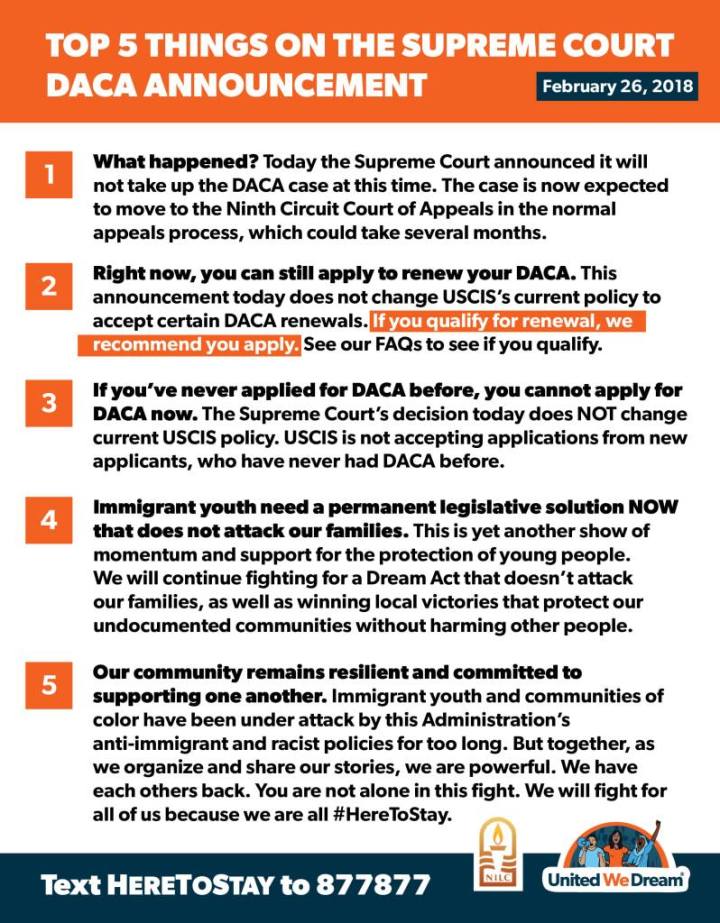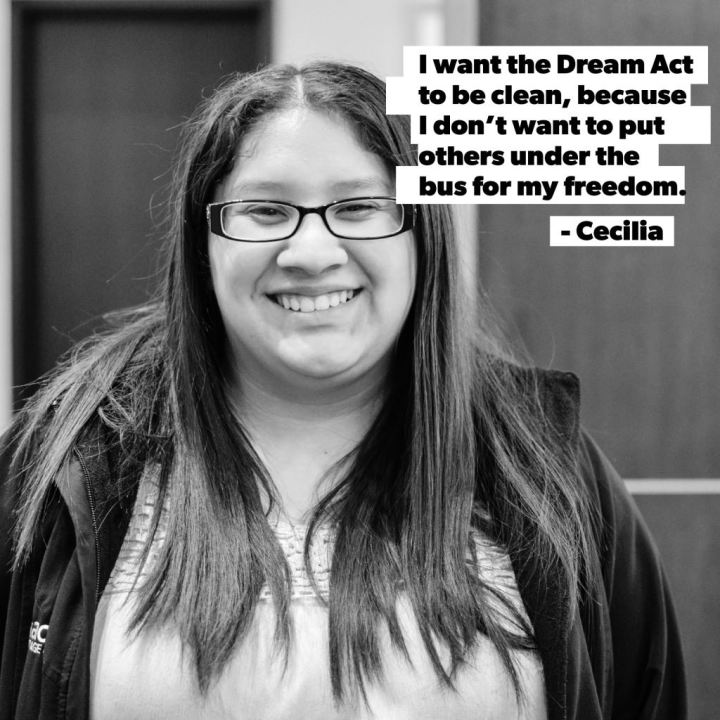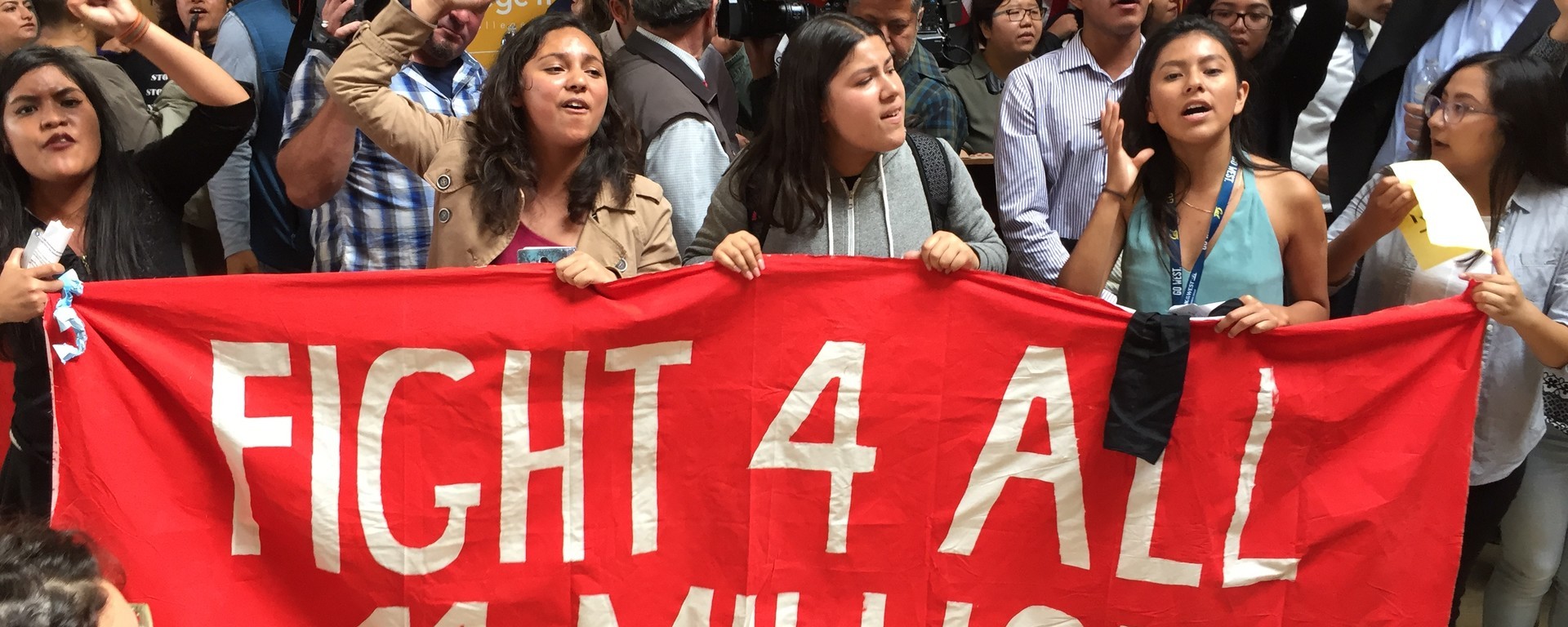Today, around 9:00AM, the U.S. Supreme Court announced that it will not hear the Deferred Action for Childhood Arrivals (DACA) case at this time. As such, the U.S. Supreme Court bumped President Trump’s appeal of a federal judge’s January 9th injunction on the administration’s ending of DACA to Ninth Circuit Court of Appeals, where the case is expected to go through the normal appeals process, potentially meaning that we are several months away from a judicial decision on DACA.

While this decision may grant current DACA recipients some more time, it does push off the deadline for congressional action (essentially vacating the March 5th deadline the administration put in place). Essentially, this decision currently and no matter its conclusion does not change the fact that DACA recipients are still in a precarious situation. As Senate Minority Whip Dick Durbin (D-Il) explained, DACA recipients future is reliant on “the next court-ruling—and how do you build a life around that?” Moreover, no matter what the court decides, it will keep DACA recipients in an immigration limbo. If the Ninth Circuit Court of Appeals sides with the administration’s decision to roll back DACA, then these individuals will lose their protected status and be eligible for deportation. People’s entire lives will be thrown into chaos. But this isn’t to say that DACA itself is a whole solution. Should the injunction be upheld, then DACA recipients will continue to have their protected status. To be clear, “protected status” does “permanent” or even “stable.” DACA recipients will still be subject to the numerous conditions the program calls for. DACA has given about 700,000-800,000 individuals the opportunity to come out the shadows, but it has given them the opportunity to become free of fear. The courts just aren’t enough.
However, it’s starting to seem like legislation might not be enough either. After Democrats failed to use pass an immigration bill during the budget showdown, there have been numerous failed attempts to reach a bi-partisan solution. In fact, immigration talks have been heated, as Democrats try to salvage DACA, Temporary Protected Status (TPS), and the diversity from the destructive force of the Trump administration and anti-immigrant members of Congress. But, the longer these talks went on, the less it seems that Democrats were willing to put up the necessary fight to protect more than just DACA recipients.
For instance, one of the biggest stories that came out of these bi-partisan talks was the President’s characterizing countries in Africa as “shithole” countries. This comment arose during the part of the conversation about the diversity lottery, in which Trump was of course demanding that this system of allocating visas be replaced by a “merit” system. At this point, Trump also asked why we can’t have more immigrants from Norway (maybe because no one from Norway wants to come to here?). When this story broke, it was and still is all people can talk about. “Shithole countries” became the new joke to add in any satirical political joke. Less talked about was the actual conversation that was being had. This conversation, which Senator Durbin recounts with Secretary of Homeland Security Kirstjen Nielsen in the video linked here, really illuminates where the Democratic Party’s current goals lie. In his questioning, Senator Durbin frustratingly asks,
“You’ve seen…the proposal which Senator Graham and I, as well as four other Senators made on a bi-partisan basis, and you’ve rejected it. You said at one point I believe that, ‘There is nothing in there that would prevent us from getting here again.’ Are you aware of the fact that included in this proposal is the entire request of the administration for border security in this fiscal year, 1.6 billion dollars for walls, barriers and fences, and another billion dollars for technology, which is exactly what you asked for. If you don’t believe this is gonna solve the problem,… then why did you request in the first place?”
When Secretary Nielsen responded that the money isn’t enough, and that what was absolutely essential to a deal was tightening family reunification policies and building a wall, Senator Durbin retorted, “if we give you some of that, can we cut back on the money?” For these administrations and legislators, no matter their intent, this is still just a bargaining game. No side of the aisles is ever going to be able to fight for real immigration reform so long as immigration is still framed as a “problem” that needs to be “solved.”

As such, DACA recipients have been put in this place where their ticket to citizenship is increasingly reliant suppressing the very community they come from and their other trans-national counterparts. As Cecilia expresses in her social media campaign for United We Dream, in all legislative conversations around the DREAM Act, DACA recipients path to citizenship comes at the cost of increased border enforcement (which will result in migrants attempting more dangerous paths into the United States, and which will result in more deaths) and forsaking an opportunity for the parents that brought them here. Last week, we discussed during the lecture whether citizenship inherently means your inclusion at the cost of others exclusion. This current debate about what to do for DACA recipients couldn’t make this dynamic clearer. As Congress puts it, the only “viable” deal is if DACA recipients receive an invitation to be a part of the nation-state, then we must push out others, from TPS recipients and to DACA recipients’ families to migrants who will try to get here in the future. There will not be the same path for all 11 million undocumented immigrants in this country. The U.S. government is handing DACA recipients heartbreak no matter what. Even if they earn “citizenship,” what does that even mean if their families are getting deported or their families’ visas are getting rejected. No matter what, DACA recipients will still live a second-class citizen life (although maybe not to the same extent). The concept of citizenship will still wreak havoc and create fear for them. Even a clean DREAM Act is still not a permanent solution. So long as we deem some migration “illegal,” so long as continue to uphold bordered nation-states and concepts of citizenship, there will always be excluded bodies, there will always be people in the shadows. The only truly permanent solution, the only real way to eliminate the deep fear in immigrant communities, is to deconstruct the nation-state model and borders that mark people’s migration as immigration.
